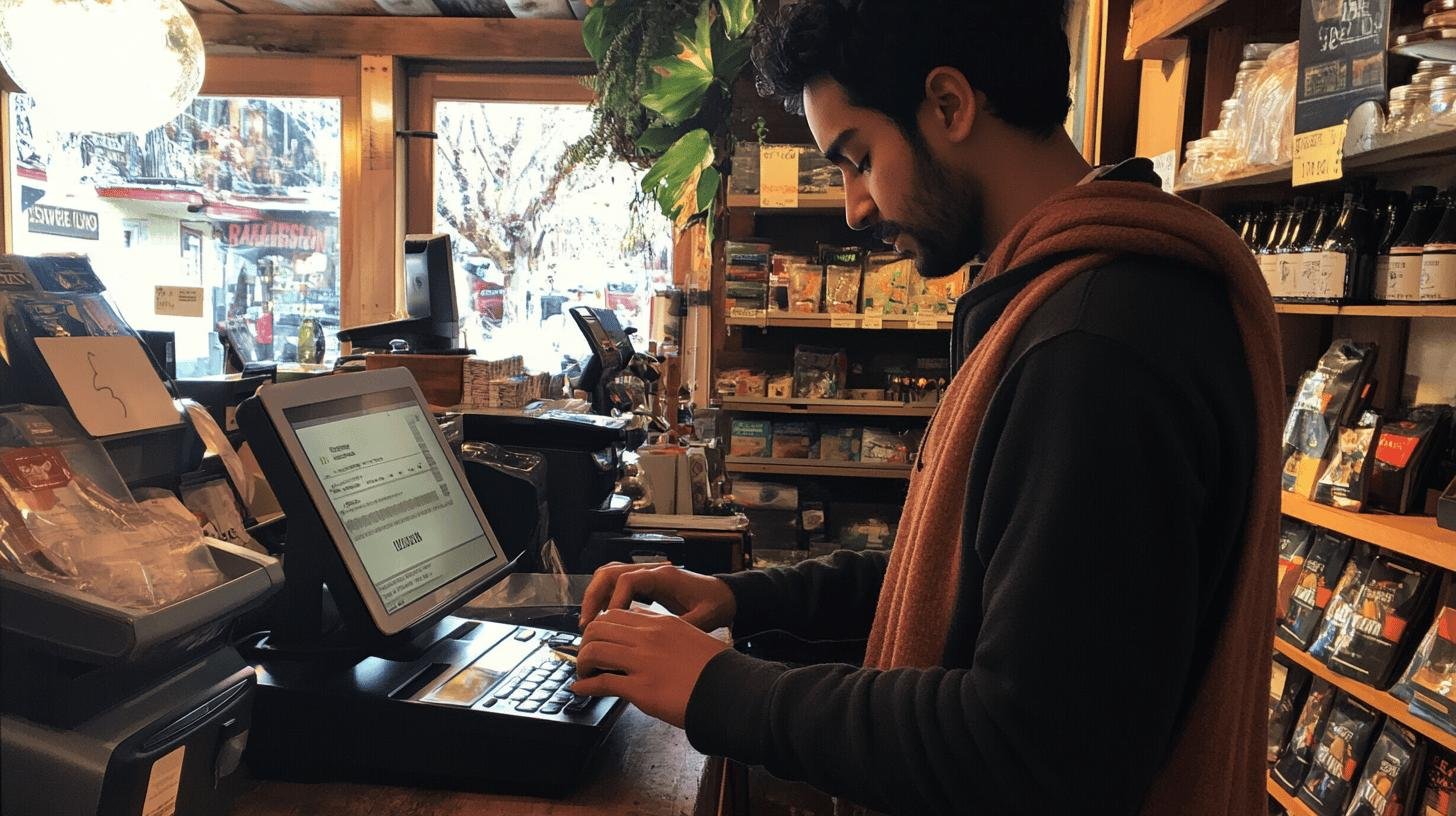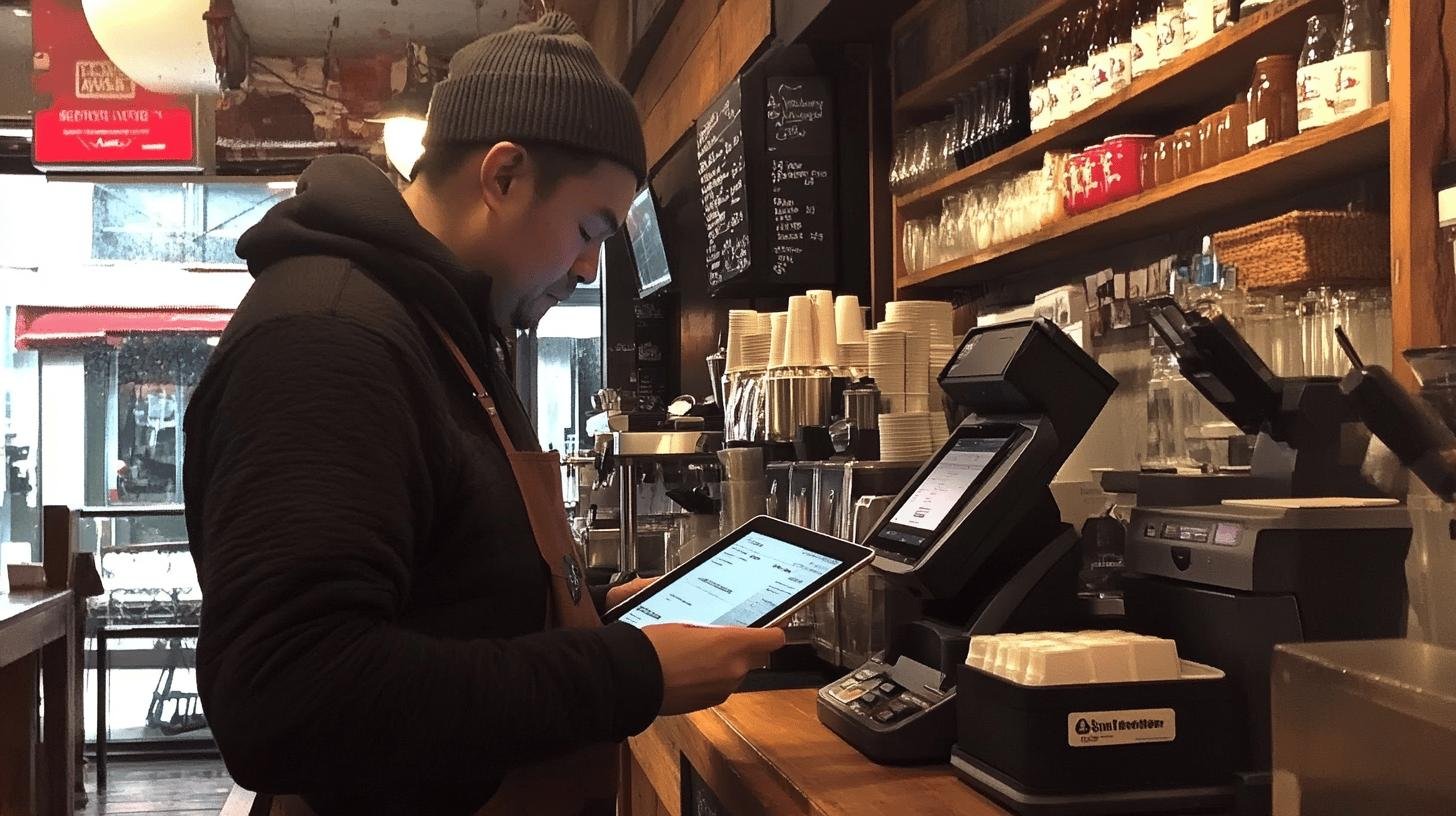TL;DR:
- POS System Definition: A POS (Point of Sale) system combines hardware and software to manage transactions and track inventory.
- Key Features:
- Transaction Processing
- Inventory Management
- Sales Reporting
- Customer Management
- Employee Management
- Cost: Initial setup costs range from $800 to $2,500; monthly fees between $50 to $300.
- Benefits: Streamlined sales, improved inventory tracking, enhanced customer experience, and detailed sales reporting.
- Drawbacks: Initial costs, ongoing maintenance, and staff training.
- Popular Systems: Square (no monthly fees), Shopify POS (online integration), Clover (customizable).
- Efficiency Gains: Automates tasks, improves customer interactions, and provides real-time data for better decision-making.
Are you wondering, “Do I need a POS system for my small business?” Is a POS system just shiny tech hype, or is it a game-changer for small businesses? For the modern small business, efficiency isn’t just a goal—it’s make or break. While some might see the initial costs of a Point of Sale (POS) system as a hit to the wallet, the potential for streamlined operations, better sales management, and enhanced customer service can’t be ignored. Investing in a POS might seem daunting at first, but could it be the tool that drives growth? Let’s break down what a POS system offers and see if it fits the bill for your business.
Understanding POS Systems for Small Businesses
A POS system, or Point of Sale system, is crucial for small businesses seeking to streamline operations. It combines hardware and software to manage transactions, track inventory, and improve customer service. The hardware usually includes a cash register, barcode scanner, and receipt printer. Meanwhile, the software handles sales data and customer interactions.
- Transaction Processing: Speeds up sales with quick, accurate handling.
- Inventory Management: Tracks stock levels in real time, reducing the need for manual checks.
- Sales Reporting and Analytics: Provides insights into sales trends and performance.
- Customer Management: Keeps track of customer preferences and purchase history.
- Employee Management: Monitors staff performance and work hours.
For small businesses, these features offer significant benefits. Efficient transaction processing minimizes wait times, improving customer experiences. Real-time inventory management prevents stockouts or overstock situations, saving time and money. Sales reporting supports informed business decisions. Meanwhile, customer management builds lasting relationships through personalized services. Integrating these functions makes a POS system a valuable investment for improving both sales management and customer service.
Weighing the Pros and Cons of POS Systems

Small business owners often wonder, “Do I need a POS system for efficiency?” The answer is usually yes, but with some considerations. A POS system can greatly enhance efficiency by streamlining operations and offering detailed sales reporting. However, it’s key to weigh these benefits against potential downsides.
Benefits of POS Systems:
- Streamlined Sales Processes: Reduces transaction times, boosting customer satisfaction.
- Improved Inventory Management: Provides real-time stock levels, minimizing errors and stockouts.
- Enhanced Customer Experience: Offers personalized service by tracking customer preferences.
- Detailed Sales Reporting: Provides insights for better decision-making and strategic planning.
Potential Drawbacks:
- Initial Setup Costs: The upfront investment can be steep for small businesses.
- Ongoing Maintenance Fees: Regular software updates and support services can add up.
- Employee Training: Requires time and resources to train staff on the new system.
To overcome these drawbacks, businesses should plan carefully. Budget for both initial costs and ongoing fees. Choose a system with user-friendly features to reduce training time. Comprehensive training ensures employees are comfortable with the system, leading to smoother operations. Addressing these factors allows small businesses to leverage POS systems effectively, maximizing efficiency while minimizing challenges.
Cost Considerations for POS Systems
Understanding costs is crucial when considering a POS system for your small business. Initial setup can range from $800 for basic systems to $2,500 for advanced ones. Monthly fees vary from $50 to $300 based on features and business size. These fees typically cover software licensing, support, and updates. Although the initial investment might be high, a well-chosen POS system can streamline operations, potentially saving money over time.
| Plan Type | Cost Range |
|---|---|
| Basic Starter Package | $800 – $1,200 |
| Mid-Range Package | $1,200 – $1,800 |
| Advanced Setup | $1,800 – $2,500 |
To find affordable POS options, consider your specific business needs. Search for systems offering essential features without unnecessary extras. Evaluate free trials or demos to ensure the system fits your operations. Comparing different providers can reveal competitive pricing and features. Weigh potential ROI—enhanced efficiency and sales tracking can help offset costs over time. Selecting the right system can be a smart, cost-effective addition to your business.
Choosing the Right POS System for Your Business

Selecting the right POS system is crucial for small businesses. The system should meet your specific needs, ensuring efficient operations without unnecessary extras. Consider factors like business size, industry, and budget when narrowing your options. A tailored choice can boost productivity and customer experience.
Assessing Your Business Needs
To choose a POS system, first assess your business size. A small boutique doesn’t need the same capabilities as a bustling restaurant. Consider your industry type—retail might prioritize inventory management, while service-oriented businesses need robust scheduling features. Specific needs like loyalty programs or accounting software integration should also be on your list.
Comparing Popular POS Systems
Among popular POS systems, Square, Shopify POS, and Clover offer distinct features and pricing. Square is known for its user-friendly interface and no monthly fees, making it ideal for startups and small retailers. Shopify POS seamlessly integrates with online stores, perfect for businesses selling both online and offline. Clover provides a range of hardware options and customizable apps, catering to businesses needing operational flexibility.
| POS System | Best For | Key Features |
|---|---|---|
| Square | Startups, Small Retailers | No monthly fees, User-friendly |
| Shopify POS | Online and Offline Sales | Seamless online integration |
| Clover | Flexible Operations | Customizable apps, Range of hardware |
Choosing a POS system requires careful consideration of your business’s unique needs. Take time to research, compare features, and use free trials to find the best fit. An informed decision can lead to smoother operations and improved customer satisfaction.
Enhancing Business Operations with a POS System
How do POS systems streamline operations? By automating tasks, they reduce manual efforts and errors. Instead of manually checking inventory, POS systems offer real-time updates, saving time and lowering mistake risks. They handle transactions swiftly, letting business owners focus more on customer interaction and less on paperwork. This automation leads to smoother, more efficient operations.
- Real-Time Inventory Management: Automatically updates stock levels, minimizing manual errors.
- Sales Tracking: Provides immediate access to sales data, improving decision-making.
- Automated Ordering: Simplifies restocking by setting reorder thresholds.
- Staff Management: Tracks employee hours and performance effortlessly.
- Customer Data Collection: Captures purchase history for targeted marketing.
By enhancing customer experience, POS systems offer a win-win situation. They speed up checkout processes, reducing wait times and keeping customers happy. With customer data at hand, businesses can personalize interactions, fostering loyalty. These systems also support various payment methods, offering convenience and flexibility. A more satisfying shopping experience encourages repeat business and positive word-of-mouth.
Accurate reporting and analytics from POS systems are game-changers for strategic planning. They provide detailed reports on sales trends and inventory status, offering vital insights into business performance. This knowledge helps identify best-selling products and understand customer preferences. With these insights, businesses can make informed decisions on inventory, marketing, and pricing. The right POS system turns data into actionable strategies, supporting growth and efficiency.
Final Words
So, do I need a POS system? For most small businesses, the answer is a resounding yes. While it might seem like a big step, a POS system can revolutionize how you run your business. It’s like having a personal assistant that handles sales, keeps an eye on your inventory, and helps you understand your customers better. Sure, there are costs to consider, but the benefits often outweigh them in the long run. By choosing the right POS system for your needs, you’re not just buying a fancy cash register – you’re investing in your business’s future. It’s a smart move that can lead to smoother operations, happier customers, and a healthier bottom line.
FAQ
Do I need a POS system for my small retail store?
If you want to streamline your sales process, track inventory easily, and get insights into your business performance, then yes, you likely need a POS system. It can save you time and help you make better business decisions.
What are the main benefits of using a POS system?
POS systems offer faster checkouts, accurate inventory tracking, detailed sales reports, and better customer management. They can also help reduce errors and make your business look more professional.
How much does a POS system typically cost?
The cost can vary widely, but you can expect to pay anywhere from $800 to $2,500 for initial setup. Monthly fees usually range from $50 to $300, depending on the features you need.
Can a POS system work for different types of businesses?
Yes, POS systems are versatile. Whether you run a retail store, restaurant, or service-based business, there’s likely a POS system that can be tailored to your specific needs.
Do I need a POS system and is it hard to learn how to use one?
While there’s a learning curve, most modern POS systems are designed to be user-friendly. Many providers offer training and support to help you and your staff get up to speed quickly.

